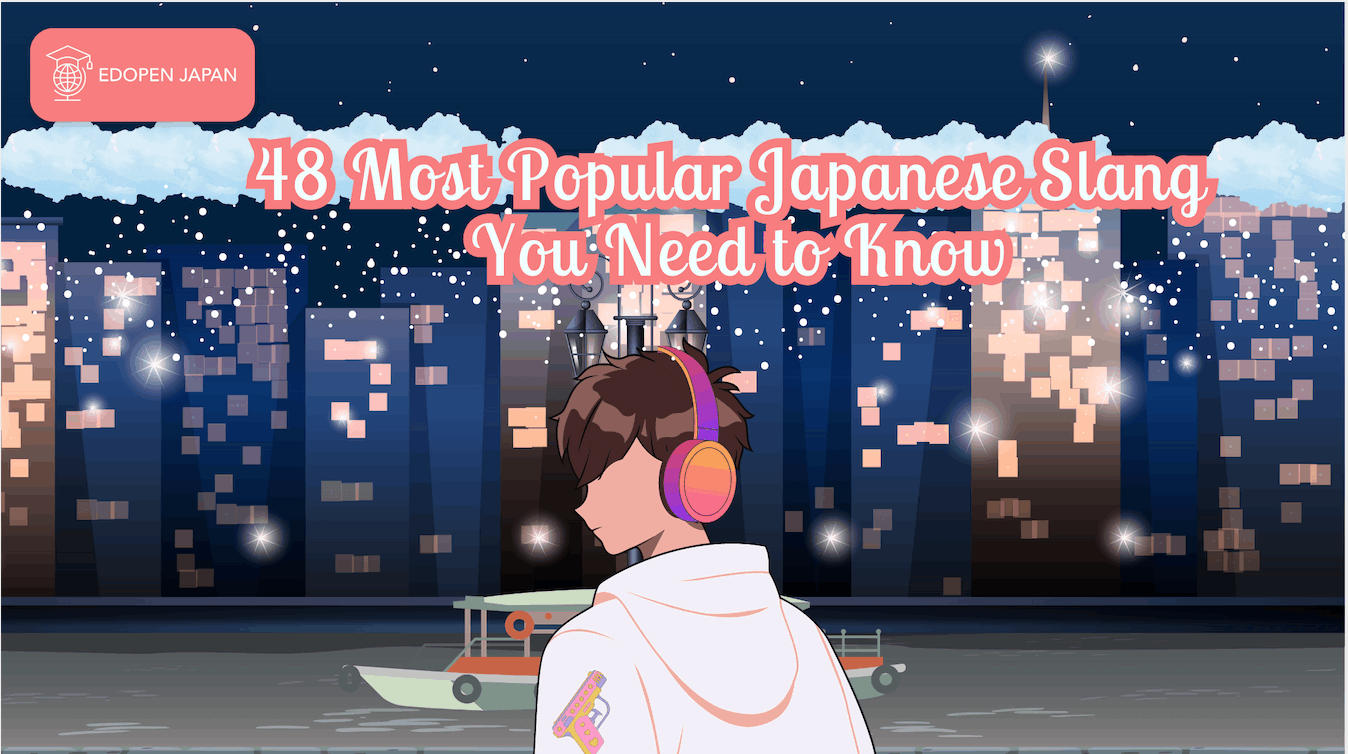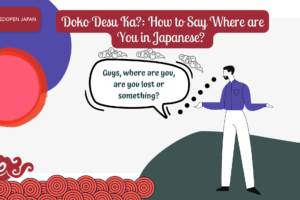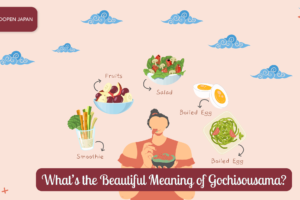Most Japanese textbooks and self-study guides teach the average, grammatically correct Japanese that most Japanese people could understand. But this “textbook Japanese” is not what is actually used in everyday life in Japan. Like any language, it changes, and it is not something fixed and static. Every year that comes, every new generation has its own unique additions and twists to the language.
Therefore, with this article, we are trying to give you a pocket guide and slang dictionary so that you can understand what everyone is saying in slang, whether it is online, in real life, or just in a TV show or YouTube video.
It is interesting to see how flexible Japanese slang is, and it helps to keep conversations fluid and short! Also, being able to understand it and, even better, use it in your everyday conversations will make you sound more fluent and friendlier!
This in itself makes you seem more approachable for normal conversation, and makes native Japanese speakers feel more confident in touching on topics that they may initially feel you don’t understand because they don’t know how fluent you are in Japanese.
A textbook will only take you so far. As they say in most Japanese schools, after the first few months, “most people don’t use “watashi” to refer to themselves in everyday life. Communicating only in textbook Japanese will make you sound stoic and too formal, sometimes even hard to approach. Or even give the impression that you are not open to making friends or interacting.
So, when you feel close enough to someone, keep the ~masu ~desu down and start talking more informally, adding some slang here and there! It is also important to note that, as always, there is a time and a place for slang and informality. We don’t recommend using slang when speaking in front of an audience, or when speaking to a teacher or boss on the clock or during class. Remember that in Japan there is always a boundary of respect and position based on social or workplace rank, age or experience.
It is interesting to note that Japanese slang is different from English slang. It is mostly used for descriptions, greetings, and expressions of emotion, and is rarely used in reference to each other. There is also a wide variety of slang that is not safe for work, but you shouldn’t use slang in the office or with a teacher.
One of the unique things about slang is that its meaning can sometimes change depending on the context and that sometimes there is no direct translation, so for each slang there will be a little explanation of it and then some examples of how it is typically used.
Some written Japanese slangs shouldn’t be used in spoken Japanese and vice versa, so they are marked with a (T) for text-only slangs and (S) for spoken Japanese slangs. If there is no mark on them, it means that they can be used in both cases. Most of the writing slang can be written in hiragana or katakana, but some is explicitly written in kanji.
Contents
1. Why do You Need to Learn Japanese Slang?
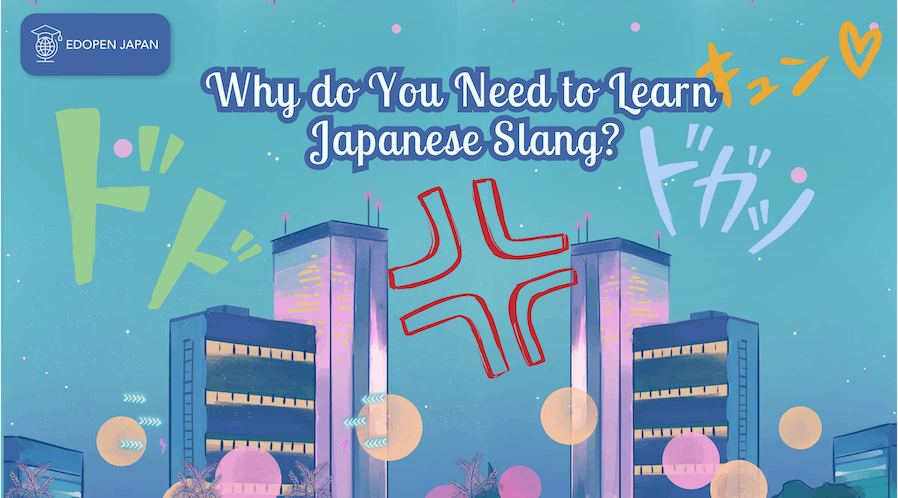
If you’re learning Japanese from scratch, you’ll probably never find slang in textbooks. This is because textbooks only teach polite, even very polite speech and language.
Therefore, if you can take the time to learn the slang used in everyday Japanese life, you can deepen your understanding of Japanese and it’s not impossible that you’ll be able to get along more easily with native Japanese friends who are around you.
Also, it’s very hard to find a dictionary of Japanese slang. Even if there is one, the slang that is available is probably out of date. When you encounter slang in everyday Japanese conversation, you may also have difficulty understanding it, so don’t misunderstand.
By learning Japanese slang, you can improve your ability to use everyday Japanese and become friendlier when talking to your Japanese friends. Or you may be able to correctly understand that certain slang words and phrases should not be arbitrarily used by you. Better yet, you shouldn’t use them at all.
Even though you may not find this Japanese slang on the JLPT exam, you may find it when you interact directly with native Japanese speakers during part-time, casual meetings and some other informal opportunities.
In addition, if you are currently studying Japanese, please also read some of our comprehensive articles below on some material on Japanese phrases, vocabulary and some important things related to learning Japanese!
Read also:
What’s the Meaning of “Naruhodo (なるほど)”?
What’s the Meaning of “Sasuga (さすが)”?
The Meaning of Yabai (やばい)
2. The List of 48 Most Popular Japanese Slang You Need to Know
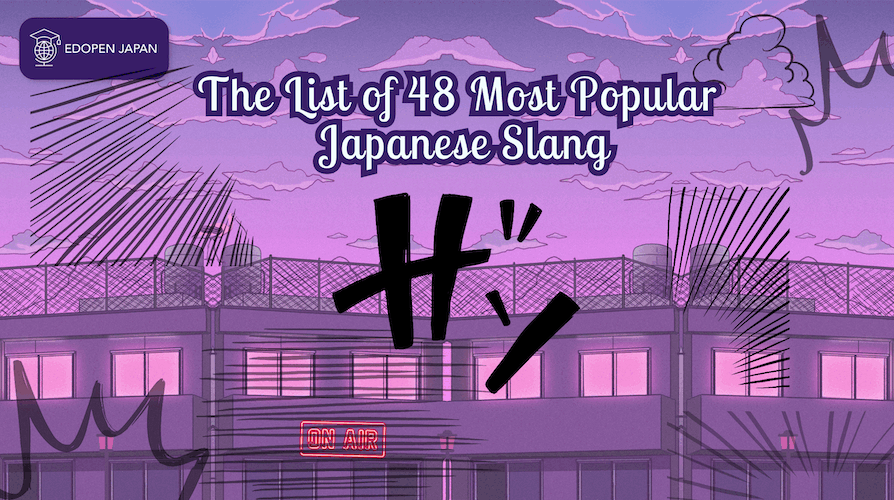
(1) ヤバイ (Yabai)
The most common slang word in Japan. It is a word that can convey any feeling, from happiness to sadness; it can mean danger and it can mean excitement. Yabai is a word that has so many meanings that it is almost impossible to summarize them in a list like this. We will add some examples of its use, as in English it can be translated in some sentences as “crazy”, since it can also be used in both positive and negative meanings.
- このケーキはやばい!
(Kono Keeki wa Yabai!)
“This cake is crazy!” - それはやパイじゃん!
(Sore wa Yabai Jan!)
“That is yabai!”
(2) マジで (Maji De)
Maji is one of the most commonly used words. It can be used in the same way as “really” in English. It can be used in the middle of sentences with で(de) before the continuation of the sentence, and it doesn’t change the structure or meaning of the sentence; it just adds more emotion to it (example 1). It can also be used to express amazement at something, and you find it hard to believe (example 2).
- Example 1:
あの動画はまじで面白い!
(Ano Douga ha Maji de omoshiroi)
“That video is maji (really) funny!” - Example 2:
それ、まじ?!
Sore, Maji?!
“Is that Maji (really true) !?”
(3) ガチで (Gachi de)
This word can be used to answer something hard to believe or in the sense of “Really” as it is the same with マジ (No. 2 example 2) or to denote that someone is doing something seriously and earnestly.
- あの人はサッカーに関してガチだから上手だよ。
(Ano hito wa sakka ni kanshite gachidakara jouzu da yo)
“That person is Gachi (doing his best) when it comes to soccer, so he is terrific.”
(4) ウザイ (Uzai)
Uzai can be translated as annoying, but not only in the sense of a child being annoying, but also when a boss, a team member, a teacher is always on top of you, checking every single thing you do and complaining about it.
- あの人は何回も同じこと聞いてくるからまじでうざい。
(Ano ko wa nannkaimo onajikoto wo kiitekurukara maji de Uzai.)
“That person comes and asks the same thing time and time again, so it is Uzai (annoying).”
(5) めんどい(Mendoi)
This word has the same meaning as めんどくさい (mendokusai), which means troublesome or bothersome, and is usually used in the exact same situations as the same words in English. While Mendokusai is exactly the same, it is more common to hear teenagers and college students use Mendoi.
- 課題は多くてつまらないから本当にめんどい。
(Kadai ha ookute tsumaranai kara hontouni mendoi.)
“The homework is a lot and boring, so It is really mendoi (bothersome).”
(6) ダサい (Dasai)
Dazai can be translated as “lame” in English and can be used in many situations, but it is most often used when referring to clothing or a person criticizing their style.
- あの恰好はまじでダサいから着替えた方がいいよ。
(Ano kakkou ha majide Dasai kara kigaeta hou ga iiyo.)
“That attire is really Dasai (lame), so you should go and change.”
(7) キモイ (Kimoi)
Kimoi is the abbreviation of 気持ち悪い (Kimochiwarui), which is used when something is horrible, disgusting, disgusting, or unpleasant.
- それはキモイからやめてくれ。
(Sore wa kimoi kara yametekure.)
“That is kimoi (disgusting), so please stop.”
(8) ド引き(する) (Dobiki・suru)
It follows the same path of feeling as kimoi. Dobiki suru is used to show that you would pull away, pull out, because something is disgusting or out of your comfort zone. It means a great feeling of disgust.
- あの変な癖にド引きする。
(Sono Kuse ni dobiki suru.)
“I dobiki (just can’t stand) that weird habit.”
(9) イケメン (Ikemen)
Changing the mood of the lousy, meaning slang, Ikemen is a word used when referring to a pretty and or cool boy. It comes from the combination of いけてる(Iketeru) “cool // popular” and メン (Men) “man”.
- あの人見た? まじでイケメンだったよ!
(Ano hito mita? Maji de Ikemen datta yo!)
“Did you see that guy? He was really ikemen (a nice looking guy)! “
(10) 美人 (Bijin)
Bijin is the gender-neutral version of Ikemen, but it is more commonly used when referring to a beautiful woman. However, it is also used to refer to a handsome man. The kanji itself means 美(Bi) beautiful 人(Jin) person.
- 芸術大学に美人が多いよ。
(Geijutsu Daigaku ni Bijin Ga ooi yo.)
“In the university of arts, there are a lot of Bijin ( Beautiful people).”
(11) まじ卍 (Maji Manji) *T*
First of all, no, this is not the symbol you think it is! It comes from a Buddhist symbol pronounced manji, and it rotates to the opposite side of what you may have thought it was. It was used as a word to express “really” in Japanese, and had exactly the same use as まじ (Maji), and for a time it carried the whole meaning just by the 卍 (Manji) symbol.
So, it was common to see messages with only 卍?! when expressing reverence for something that had been said before. This was a popular word in 2017-2019, but it’s become less common lately, and now it also gives the feeling of an older person or someone stuck in the past trying to pass as cool.
(12) り (Ri) *T*
Well, first it was 了解です。 (Ryoukai Desu), then 了解 (Ryoukai). Then 了 (Ryou), then りょ (Ryo), and now it has become り (Ri)‖
This is a word that the younger generations have reached the peak of abbreviating. It carries the meaning of “got it!” or “understood!” in English. And it is common to see りょ and 了 users in the wild, but between the youngest generation, the most common form of this slang is り. The original 了解です or 了解しました (Ryoukai shimashita) can be used when speaking formally to denote understanding of a statement said before.
- Aさん: 明日、あの本持ってきてくれない?
(Ashita, ano hon mottekitekurenai?)
“Can you bring me that book tomorrow?” - B さん: り // (Ri.) // “Ok.”
(13) ドンマイ (Donmai)
ドンマイ is a word derived from the English phrase “Don’t mind it” with its Japanese twist. It has been shortened to just the beginning of “Don-” and “Mi-” to become ドンマイ (Donmai), and is used when someone fails or does something wrong and the user tries to comfort them by saying, “Don’t mind it.
- Bさん: ごめん! 本を持ってくるの忘れた!
(Gomen! Hon wo mottekuru no wasureta!)
“I am sorry! I forgot to bring the book!” - Aさん: あー。ドンマイ。
(a-. Donmai.)
“Aahh… Donmai (Don’t mind it)”
(14) それな (Sorena)
Sorena is a convenient word to show affirmation of a statement. It is like “That!” in English, and it is possible to use it alone.
- Aさん: この授業はまじで面白くない。
(Kono Jugyou wa majide omoshirokunai)
“This class is really boring.” - Bさん: それな。
(15) せやな (Seyana)
Seyana has the same meaning as the above それな (sorena), it is just a variation that started in the 関西 (Kansai) region. region, but thanks to the widespread use of the Internet and the media, it has become common to hear it all over the country.
(16) せな (Sena)
It is a contemporary variation of No. 15 せやな, where it becomes even shorter by removing the や in the middle, but the meaning and use does not change, but it is mainly used in text form, but some people use it when speaking.
(17) 笑 (Wara)
Wara is the kanji for laughing in Japanese and is used as LOL in English. It can be used at the end of a sentence or on its own, just like its English counterpart.
(18) www (wara wara wara)
It is the first chapter typed to write 笑, and it means more laughter than 笑 alone. It can be stacked as many times as needed and can replace 笑 with just one “w”.
(19) 草 (Kusa)
Born from a Japanese online comment that said a long line of “wwww” looked like manga grass. 草 has become the latest replacement for “www”. While people over the age of 20 find 草 uncomfortable to use out loud, younger generations usually use it as a spoken word among themselves.
(20) ワロタ (warota)
To keep it simple, it is a geekier word than the other variants explained above, and it has more of an “LMAO” feel than “LOL” in English. It is usually used as a one-word response to a message to someone, and while it is not common to hear it used in conversation, it is not unheard of.
(21) 感ある (~Kan aru)
A literal translation of this slang word would be “has a feeling of. It is used after a sentence to indicate that it feels that way, without ultimately affirming or negating anything. It can be understood as “in my opinion” in English, except that instead of coming at the beginning of the sentence, it comes at the end. Some examples of its use are:
- 嘘ついてる感ある。
(Uso tsuiteru Kan aru)
“It gives me vibes that it is a lie.”
- 安っぽい感あるよ。
(Yasuppoi Kan aru yo)
“It gives vibes that it is something cheap.”
(22) ありよりのあり (Ari yori no Ari)
It’s a fairly new word, and some people over the age of 20 may not understand it. It is simply used to say that there is a high possibility that something will happen. A translation could be “a possible laying possibility” It uses the あり from “あり得る “(Ari Eru) “possible”. And it is generally used on a cheerful nuance.
- A: テストどうだった?黒点とれる?
(Tesuto dou datta? Kuro ten toreru?)
“How was the test?, do you think you got a passing grade?” - B: ん~ありよりのあり!
(Nnn~ Ari yori no ari!)
“Hmm, I might have!”
(23) ないよりのあり (Nai yori no Ari)
It is the opposite of “ありよりのあり”. (Ari Yori no ari) because it has the same meaning, but with a negative connotation. There is a really small possibility of something being true or becoming a reality.
- A: まさか、あの二人、付き合ってる??
(Masaka, Ano futari, Tsukiatteru??)
“Don’t tell me, are those 2 a thing??” - B: イヤーないよりのないでしょー。
(Iyaaa, Nai yori no nai desho-)
“Naah, It can’t be right?”
(24) めっちゃ (Meccha)
A commonly used slang word to mean “very,” “extremely,” or “excessively,” it is used by a lot of people, and it is one of the long-standing slang words, so it is common for some older people to understand the meaning and use of it. It is used before the object of the word.
- このケーキめっちゃ甘い!
(Kono Ke-ki, meccha amai!)
This cake is very sweet!
(25) ちょう // ちょ // 超 (Chou // Cho // Chou)
Added at the beginning of an adjective, such as 面白い(Omoshiroi) “Interesting/funny”, 辛い(Tsurai) “Harsh”, きれい(Kirei) “Beautiful”, 楽しい(Tanoshii) “Fun” to emphasize the word.
It could be translated as “Super”, so ちょう綺麗(Chou Kirei) would be translated as “Super beautiful!” or ちょ辛い(Cho Tsurai) “Super hard” It can be used in both speaking format and text. The use of kanji is optional, but it is normal for advertisements using this word to use the kanji form of it.
(26) ハズイ (Hazui)
It is just the abbreviation of the word 恥ずかしい (Hazukashii) “embarrassing. It is a word from the Kansai dialect, but the younger generations have adopted it all over the country.
(27) すこ (Suko)
Allegedly started as a typo, it has recently been adopted by the anime and idol otaku communities to say “好き (Suki)” more informally. Like” more informally. It is usually directed at an idol or character.
(28) わっかんない (Wakkanai)
A fairly common abbreviation of わからない (Wakaranai) “I don’t understand”. It is used in both text and speech as it is easier to pronounce than the grammatically correct version. Prolonging the ん pause can indicate how lost the user is with the information given.
(29) 推し (Oshi)
Oshi is the way to call your favorite character in a series or a member of a group or band. The one you like the most. You can just say 推しは_. “Oshi wa _” (My favorite is ).
(30) 推し活 ( Oshi Katsu)
Together with the previous word, 推し, and the kanji 活 for “life” or “activity” Oshikatsu, it is used to refer to the activity of going to events, buying goods, or simply watching something just because you want something related to your favorite character. It is mainly used online and when talking to yourself
(31) DD (Daredemo Daisuki)
It refers to someone who likes everyone and says that every character or artist is their favorite. It is only used in text messages. When speaking, it is common to use the whole words instead of the pronunciation of “DD”.
- A: あーBさんとCさんの声めっちゃいいよね!あ!でもZ君もすてっき!
(Aaaa, B-san to C-san no Koe meccha iiyone! A! Demo Z-kun mo sutteki!)
“ahh, B-san and C-san’s voices are really great, right? Ah! But Z-Kun is also lovely!” - B: DDじゃん!
(DD Jan!)
(32) 尊い (Toutoi)
The direct translation would be “precious” or “valuable”. However, recently it has been adopted by the otaku and idol community to refer to an image, action, or information about their favorite characters online. It can be used alone or with それ” Sore”, あれ” Are”, これ” Kore” は尊い “wa toutoi”. It is mainly used online, but it is common to hear people using it at certain events in the idol or otaku genres. But it is not typical for ordinary people on the street to understand.

(Oshi ga toutoi!)
(33) (インスタ)映え ( (Insta) Bae)
With the combination of the abbreviated version of Instagram インスタ “Insta” and the kanji 映 for “flow” or “shine.” It is used for pictures or actions posted online to gain fame or likes.
Recently, the インスタ part has been lost, and 映え has taken on a verb form by itself, so it has recently been used as 映える “Baeru” to say that it will become famous online.
- めっちゃきれいじゃん!これ絶対映える!
(Meccha Kirei Jan! Kore Zettai Baeru!)
“This is super beautiful! This will surely become popular online!”
(34) ぐぐる//ggr (Guguru) (T)
It is the verb form of the abbreviation of Google. So when used just as a verb, ググる means to search for something online. Recently, it has become even shorter by using only the consonants of the word.
- ちょっと待ってググってみる
(Chotto matte Gugutte miru.)
“Wait a bit; I will search for it.”
(35) 乙 (Otsu)
The kanji means “second party in an agreement” or the defendant in a jury trial. However, recently, more than the meaning of the kanji, what has made it popular is its pronunciation; おつ “Otsu” as it is the standard way that you say to someone close お疲れ様 “Otsukaresama”. So when a friend finishes something, say おつー! “Otsuu” to them, or in text, just send them 乙! instead.
- A: テストおわったー! (Tesuto Owattaa!) “The test finisheeed!”
B: 乙! “Otsu!”
(36) いってら、// Itr (Ittera)
It is the abbreviation for いってらっしゃい. And it is commonly used when someone just goes somewhere for a short time and then comes back. As the same as ぐぐる “Guguru”, in the text, it loses the vowels and becomes a word made up only of the remaining consonants.
- A: ちょっとコンビニ行ってくる。
(Chotto Konbini ittekuru)
“I will go to the convenience store for a bit.” - B: 行ってら!
“Ittera!”
(37) なう (Nau)
Nau is the phonetic pronunciation of the English word “now,” and it carries the same meaning, expressing that something is “now. It also carries a slightly joyful nuance, as if waiting for what is to come.
- コーヒータイムなう!
(Koohii taimu Nau!)
“Coffee time now!”
(38) だっる!//だりぃー (Darru // Darii)
Both are slight variations of the word だるい // 怠い (Darui), which is used when you are doing something that is annoying and you would rather not do it. The use of だっる is more gender specific, but the use of だりぃー (Darii) is mainly used by guys because it gives a slightly cool feeling.
- 明日また同じ授業があるよ!だっるー!
(Ashita mata Onaji Jugyou aruyo! Darruu!)
“I have the same class tomorrow! Such a bother!”
(39) やん (Yan)
It is based on the fact that in the Kansai region, some pronunciations of じゃ are changed to や、, and this one is no exception, it is just used as a slight twist on じゃん (Jan) while still having the same nuance.
(40) オシャンティー (Oshantii)
The word おしゃれ (Oshare) is used to mean stylish and fancy, and オシャンティー is just a variation of that made by the younger generation. It is important to note that it is considered old by some people. So it’s better to wait until the other person uses it if you don’t want to be seen as an old person trying to pass as cool.
(41) はにゃ? (Hanya?)
A cute way of saying that you didn’t understand something or that you are lost in the conversation. It is mostly used alone and then followed by asking what you didn’t understand.
(42) ぴえん (Pien)
This is the text that replaces the “crying” emoji. The one with the sobbing eyes. It is used in a light-hearted way, mainly by girls, to express that something is too good or too bad to bring someone to tears.
- 景色きれいすぎてぴえん。
(Keshiki Kirei sugite pien!)
“The scenery is so beautiful I am about to cry.”
(43) メンヘラ (Menhera)
Menhera is the way to call a person who is a bit strange and easily falls into depression or sad feelings. It is also used to call a girl of “short leash” and is always stalking her boyfriend, or a girl who asks for things just to dislike them.
afterwards. While it is mainly used by guys to refer to girls who are a bit “special” to treat, it is not uncommon for girls to call themselves Menhera or for a guy to be called Menhera. It is simply used as a な形容詞 (Na-type adjective).
(44) リムる (Rimuru)
It is a slang verb used to determine when to remove or unfollow someone from a social networking site. Like Twitter or Instagram.
- A:あの俳優まだフォローしてる?
(Ano haiyuu mada foroo shiteru?)
“Are you still following that artist?” - B:めちゃくだらないものを投稿するからもうりむったよw。
(Meccha kudaranai mono wo toukou suru kara mou rimutta yo w)
“They post a lot of really stupid stuff so I unfollowed already, lol.”
(45) ~してもろて (~~Shitemorote)//~してもろって。
This is a variation of ~してもらって (Shitemoratte) “Please do ~~”. It is mainly used online, but it is not strange for some people to use it in everyday life. Since it is the same with やん(Yan) and じゃん (Jan), it has the same use, only the pronunciation changes.
- フォローしてもろて。
(Foroo shite morote)
“Please follow me”
(46) マウント(をとる) (Maunto (Wo toru) )
It could be considered the Japanese version of the English slang “flex on someone. It is used when showing off to someone.
- A: 今回のテスト、満点とったよ!Bさんは?w
(Konkai no tesuto, manten totta yo! B-sanha? wara)
“ This time I got a perfect score on the test! And you B-san? Lol” - B: こんなくだらないテストでマウントとるなよ!
(Konna kudaranai tesuto de maunto torunayo!)
“Don’t be flexing on a stupid test as this one!”
(47) ワンチャン (Wan Chan)
No, it is not Doggy. It is used as an abbreviation of the English phrase “One Chance,” which means that there is a possibility, however small, that something might happen in Japanese. It is usually used to mean that something good might happen.
Depending on the generation, it may be considered dead or in life support slang. So there is a possibility that it may become completely obsolete in a short time.
- A: 今回のテストマジでやばかったやん!受かるとおもう?
(Konkai no tesuto maji de yabakatta yan! Ukaru To Omou?)
“The test was super hard this time! Do you think you will pass?” - B: ん~、ワンチャン90点取れると思う。
(Nnn、Wanchan kyuujuu ten torero to omou.)
“Hmm, I think I was able to score a 90 this time.” - A:がち?!
(Gachi?!)
“For real?!”
(48) ばっか (Bakka)
Continuing with the slang, which at first glance could be confused with another word, no it is not ばか (Baka) “stupid”, but ばっか(Bakka), it is taken as an abbreviation for ばかり (Bakari) “only”, “nothing but”. It has the same meaning as the original word, and while it was first used only by men, it is now used by everyone in everyday life.
It is important to say that if you try to use it and you don’t feel completely confident with your pronunciation, or the context is a bit ambiguous, you might end up calling your friend stupid by mistake.
- A: K先輩から聞いたけどY先生の授業に女性が多いんだって? どう? 今回こそ彼女作れそう?
(K Senpai kara kiitakedo Y-Sensei No Jugyou ni Josei ga Ooin datte? Dou? Konkai koso Kanojo Tsukuresou? )
“I heard from K-sempai that Mr. Y’s class has a lot of women, right? How was it? Do you think that you will be able to get a girlfriend at last?” - B: マジで先輩に騙されたよ!K先生の授業は本当につまんないよ!しかも男ばっか!最悪!
(Maji de senpai ni damasareta yo! K-Sensei no Jugyou wa hontouni tsumannai yo! Shikamo otoko bakka! Saiaku!)
“I really got tricked by our senpai! Mr. Y’s class is super boring! And what is worse, there are only guys! It really is the worst!” - A:草!
(Kusa)
“Lmao!”
3. When Can You Use Japanese Slang?
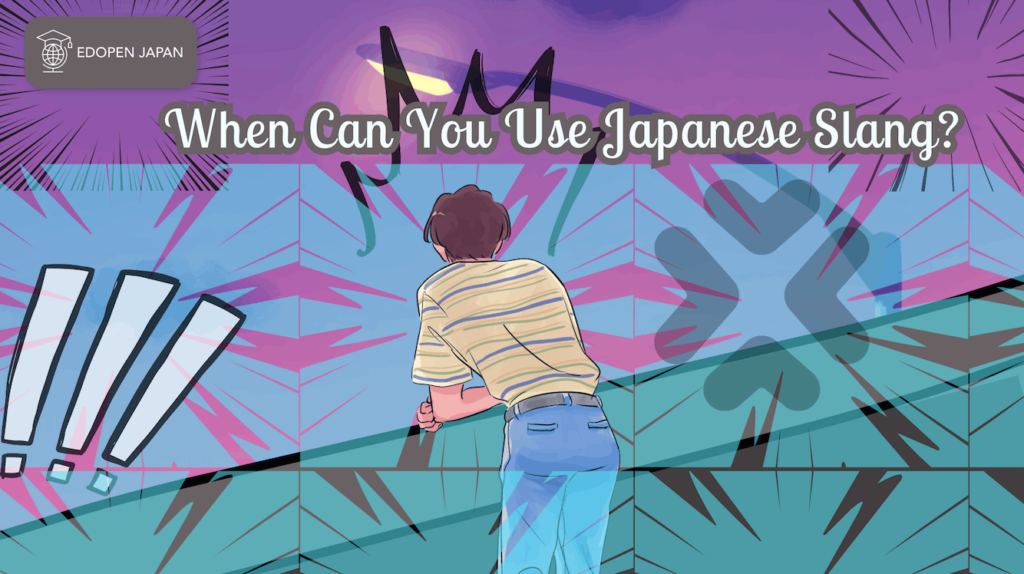
You must be careful when using Japanese slang. Because the Japanese language emphasizes the norms of politeness. You can’t use it in every situation and for everyone. Therefore, you can only use Japanese slang at certain times, such as
- With people of your own age who use it first. You can pay attention to other people who like to joke when talking, for example, but you must also be careful not to sound rude, domineering, or even hurt the other person you’re talking to, even if they’re your peers, because you could be considered rude.
- Do not talk to your teacher or older person. Even if they are speaking to you casually. This is very important to remember because the Japanese language values politeness and respect for others.
- Don’t use it on your boss under any circumstances. You must be careful in the company. In particular, when you are at work, no matter how close you are to your boss or senior managers in the company, you must remain polite. Disrespect can affect the way you treat seniors and bosses in your company. Even if they use Japanese slang, it’s enough for you to understand what they mean. However, you should think carefully about whether you want to use it.
You may or may not use Japanese slang, but only in front of your colleagues. Even then, it’s only in the context of a joke or in a really relaxed state. Be careful when using it! Understand exactly when native Japanese speakers use it.
Conclusion
We hope that this list will be useful in learning the Japanese that is actually used between close friends and for fun, so feel free to use it, or at least we hope that you will be able to understand more of what people are saying to each other so that you can join in the conversation. And keep in mind that these are just the most common slangs in the Japanese language.
Between regional variations, accents, and special slang used in certain circles, the amount of Japanese slang that exists is innumerable, but that only means that if there is a slang that is not here, it may have been brought to life, or it may be a new slang that has just been introduced to the world.
In that case, don’t be ashamed to ask the person who said it what it means. Because the only thing worse than not knowing something is to pretend that you know it and just stay in doubt!

